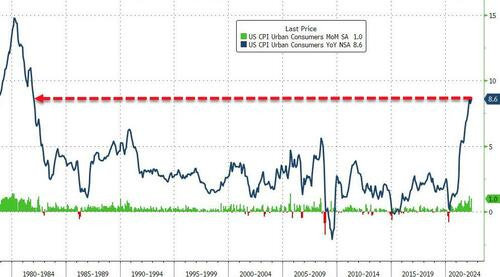This will be a brief roundup. Before getting into the military quagmire, there has been another Ukrainian update regarding their casualties—which has been a closely guarded state secret. Last week Zelensky to admit to up to 100 dead per day, but now:
Ukraine Belatedly Admits 'Heavy Casualty Rate' In Appeal For More Weapons From West
Ukraine's government has thus far kept its military death toll a tightly guarded secret, now four months into the conflict, even as heavy international scrutiny has focused on Russian losses amid prior widespread speculation and assertions that Russia was "losing".
However, there's been a noticeable shift in Western media and among the national security pundit class over the past weeks as Russian forces begin to solidify hold over nearly all the Donbas, and as the final Luhansk holdout city of Severodonetsk's fall looks imminent.
With this backdrop, Mykhaylo Podolyak - a senior advisor to Ukrainian President Volodymyr Zelensky - admitted Thursday that Ukraine is losing between 100 and 200 troops per day amid the Russian onslaught. The figure is significantly revised upward compared to President Zelensky only last week offering a loss estimate of between 60 and 100 troops each day.
Oh, and remember all those reports about how Russia is running out of tanks and artillery and missiles and troops and generals?
“This is an artillery war now,” said deputy head of military intelligence Vadym Skibitsky. He said in terms of ongoing front line fighting which he dubbed "where the future would be decided," the reality is "we are losing in terms of artillery."
"Everything now depends on what [the west] gives us," he told The Guardian. "Ukraine has one artillery piece to 10 to 15 Russian artillery pieces. Our western partners have given us about 10% of what they have." In appealing for Kiev's Western backers to send more, particularly the United States, even after billions spent on military aid, he stressed that the military is fast running out of munitions:
…
“If [the Russians] succeed in the Donbas, they could use these territories to launch another attack on Odesa, [the city of] Zaporizhzhia [and] Dnipro,” said Skibitsky of still Ukrainian controlled cities but which remain in striking distance of Russian-occupied areas.. “Their aim is the whole of Ukraine and more.”
He said further that Russia's weapons supplies can far outlast what Ukraine currently has - up to at least a year before Russia would have to manufacture more or else mobilize the population to ramp up production, according to his description of the situation to The Guardian. But given these admissions, and that the reality now slowly dawning on the West that Russia's military won't be able to be dislodged from the east, but with Kiev still resistant to the idea of a negotiated settlement, what's the endgame here?
Now, deeper into the quagmire. Larry Johnson has republished a relatively brief piece by Helmholtz Smith:
Smith does something smart. He starts his piece by reminding us of the 2019 Rand study Overextending and Unbalancing Russia. As we’ve previously discussed, what the Rand study demonstrates that it has for years—because the Rand study didn’t come out of nowhere—been “Interagency” Deep State policy to destabilize Russia, using Ukraine as the lever of destabilization—to provoke Russia to plunge into a military quagmire that could bring about the fall of Putin. This policy was the typical product of Neocon fantasy, not reality. As Smith points out:
… like most Western plans [this one was] erected on the whim that Russia’s economy “is comparatively small and highly dependent on energy exports”, [and] saw Ukraine as “[Russia’s] greatest point of external vulnerability”.
That assumption is now being tested and it doesn’t look as if it’s Russia that has been sucked into the Ukrainian quagmire.
We’ve just seen the deputy head of Ukrainian military intelligence admitting that “This is an artillery war now … we are losing in terms of artillery." Smith goes into a bit of detail on other “wonder weapons” supplied by the West that were supposed to turn Ukraine into a quagmire for Russia—Turkish drones, those US antitank missiles that Zhou claims Ukrainians name their children after (“not a joke!”, except that Ukrainian prisoners are saying the Javelins don’t work very well), and more. The West—meaning, mostly the US—is expending billions of dollars and depleting its weapons inventory to an alarming extent, all in aid of a military that’s being steadily ground down. Meanwhile, Ukrainian military intelligence tells us that, unlike the West, the Russians have a virtually unlimited supply of arms and ammunition—for purposes of this war. Some quagmire—and what ever happened to that Russian logistics logjam? Of course, not content with one fiasco at a time, the US is stirring the pot elsewhere around the world:

And so Smith observes:
So we have to ask the experts in RAND who is really overextended and unbalanced? Every day brings Europe closer to a cold and hungry winter. Everybody has learned now how important potash is but who knew that Russia was a major supplier of neon and what it was used for? [Not to mention titanium, which is heavily used in the M777 howitzer systems.] And wasn’t the ruble supposed to be rubble? “European nations are paying heavily for the sanctions imposed on Russia“. Meanwhile Russia’s raking in the money. Maybe people who think that Russia has “nuclear weapons and oil wells and nothing else” aren’t the shiniest turnips in the basket and shouldn’t be allowed anywhere near a decision.
Hmmm. That reminds me of a Don Surber quip from yesterday, in a different context:
It is not amateur hour at the White House. It is expert hour, and a reminder that experts built the Titanic and an amateur built the Ark.
And, of course, our quagmires don’t end in Ukraine. The fact is, most Americans no longer give a thought to Ukraine from one day to the next. They have concerns that are hitting them closer to home:


Remember when inflation was going to be “transitory”? You’re not hearing much of that talk any more. Check out these totally predictable headlines:
US Consumer Prices Reaccelerate In May, Highest Since 1981
Having briefly slowed its inexorable rise in April - offering reawakened hope for the 'transitory' or 'peak' inflation camp - consumer prices were expected to continue accelerated in May (as energy costs soared). Consumer prices rose by a far larger than expected 1.0% MoM (significantly higher than the +0.3% MoM in April and the +0.7% Exp). That sent the YoY CPI to +8.6% - a new cycle high...
Source: Bloomberg
Why is bad news always “unexpected”? What does this tell us about business reporting?
There are a number of signals that the US economy is getting weaker even as inflation gets stronger.
…
Target announced plans to cancel orders from suppliers and slash prices to clear out amassed inventory. Why? Because consumers aren’t buying their stuff – particularly hardline goods such as clothing and home goods.
Why have revenues at Target and other retailers plunged, even while retail sales numbers have remained strong? In a nutshell, consumers are paying more and getting less.
And, yes, consumers have taken note:
Consumer Sentiment Collapses To Record Low In June
In a stunning miss, University of Michigan Sentiment collapsed in preliminary June data, crashing from 58.4 to 50.2 (massively below the 58.1 expectations). The current conditions gauge sank to a record-low 55.4 from 63.3, while a measure of expectations decreased to 46.8 from 55.2.
Source: Bloomberg
That is the lowest reading ever for UMich.
Meanwhile, to distract us all past November, the Progs and Neocons (like the despicable Liz Cheney) are offering us their version of bread and circuses. Good luck with that. Imagine how the economy will be looking by then! :

Is there light at the end of this tunnel? Maybe:


Meanwhile, on board the Titanic …
Miley Cyrus To Perform Halftime Show At Jan. 6 Committee Hearings
Dems To Hold June 9th Hearings To Get To The Bottom Of Why No One Watched Jan. 6th Hearings
WASHINGTON, D.C.—The House of Representatives passed a resolution Friday to establish a June 9th Committee to investigate the poor ratings performance of the January 6th Committee.
Democratic leadership is reportedly thrilled to get back to work for the American people by finding out why the American people don't care what they have to say.
"This is the work that really matters," said President Joe Biden. "I for one would like to find out what TVs are and how people get inside them. No, I'm serious."
According to sources, Rep Alexandria Ocasio-Cortez has gracefully accepted the role of committee chairwoman and is eager to begin investigating why no one cares about congressional grandstanding. …
Congress—now there’s a quagmire!






https://www.zerohedge.com/markets/shocked-wall-street-reacts-todays-scorching-cpi-print
A Shocked Wall Street Reacts To Today's "Scary" CPI Print
It was a CPI report for the ages: with most already expecting a hotter than expected print (thanks to JPM), that's precisely what they got and then some.
I like Rep. Davis' thinking regarding the preservation order for the J6 groupies, but does anyone paying attention to the current DOJ/FBI tag team believe these rats give a hoot? We can't even rid ourselves of Garland and Wray for more than two years. The only real weapon a Republican congress has is cutting off or reducing funding for these two corrupt entities.